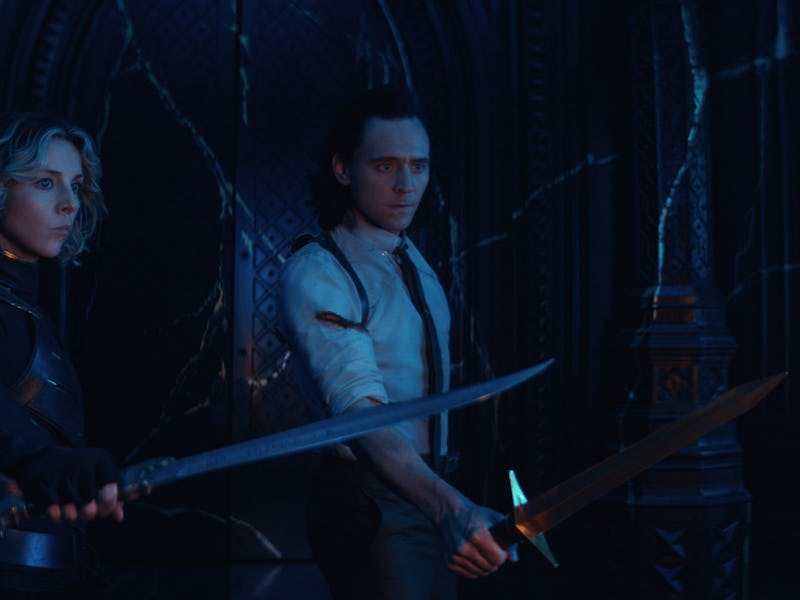One year ago, Loki shattered the MCU — but did it matter at all?
The destruction of the TVA unleashed consequences that Marvel still hasn’t followed through on.

It’s now been one year since the Loki Season 1 finale premiered on Disney+.
The episode, called “For All Time. Always.,” concludes with Sylvie (Sophia Di Martino) killing the creator of the Time Variance Authority, a kooky variant of Kang the Conqueror known as He Who Remains (Jonathan Majors). The episode’s final moments subsequently see Loki (Tom Hiddleston) end up stranded in an alternate reality ruled by Kang the Conqueror.
When it was released, the episode’s conclusion seemed to set up multiversal chaos for the Marvel Cinematic Universe. But even though films like Spider-Man: No Way Home and Doctor Strange in the Multiverse of Madness have provided small doses of that, the Phase 4 titles that have followed Loki have failed to follow through on its promises.
Loki’s Season 1 finale, a year later
Sophia Di Martino and Tom Hiddleston in Loki Episode 6.
In the year since the first season of Loki came to an end, Marvel Studios has released What If…? Season 1, Shang-Chi and the Legend of the Ten Rings, Eternals, Hawkeye, Spider-Man: No Way Home, Moon Knight, Doctor Strange in the Multiverse of Madness, Ms. Marvel, and Thor: Love and Thunder.
Of all those films and shows, the first season of What If…? is the only one that feels connected to Loki’s multiverse-breaking conclusion. Eternals, Shang-Chi, Hawkeye, Moon Knight, Ms. Marvel, and Thor: Love and Thunder have all told stories about characters who are totally disconnected from Loki. No Way Home and Multiverse of Madness only feel tangentially related at best.
Neither film references the events of Loki, nor has any other Marvel product released over the last 12 months. Considering that Loki’s Season 1 finale literally shows the MCU’s various timelines begin to branch off and cross over with one another, the fact that the episode’s events have been totally ignored is disappointing.
Mobius (Owen Wilson) and Hunter B-15 (Wunmi Mosaku) witness the destruction of the Sacred Timeline in the Loki Season 1 finale.
Of course, Marvel hasn’t actually acknowledged the growing insignificance of the Loki Season 1 finale. During a red carpet interview for Multiverse of Madness earlier this year Kevin Feige was asked about Loki’s impact on the MCU, and the studio president’s response left something to be desired.
“Fans know Loki and Sylvie did something at the end of that series that allowed all of this to be possible,” Feige said. “He Who Remains is gone and that allowed a spell to go wrong in Spider-Man: No Way Home, which leads to the entire multiverse going quite mad in this."
But the films Feige references don’t actually support his statements.
Sophia Di Martino’s Sylvie ends up alone after killing He Who Remains (Jonathan Majors) in the Loki Season 1 finale.
In Spider-Man: No Way Home, Doctor Strange’s spell doesn’t go wrong because of anything that happened in Loki, but because Peter Parker (Tom Holland) keeps trying to rewrite the spell’s effects while it’s being cast. The multiverse doesn’t go “mad” in Multiverse of Madness because of anything that Sylvie, He Who Remains, or anyone else did in Loki either.
Instead, its multiversal plot is the result of Wanda Maximoff’s (Elizabeth Olsen) desire to reconnect with her sons in another universe, which makes the Doctor Strange sequel’s story more connected to WandaVision than Loki. It’s hard to see how Kevin Feige sees any real connections between Loki, No Way Home, and Multiverse of Madness. After all, the Loki Season 1 finale doesn’t end with the creation of the multiverse explored in those films.
Instead, the episode’s conclusion results in a rapid expansion of the multiverse, one that will inevitably lead to the birth of multiple evil Kang variants and, therefore, a multiversal war. But at no point in either Multiverse of Madness or No Way Home does a multiversal war seem like a possibility, and Jonathan Majors’ Kang is absent from both films.
A year later, we’re still waiting to see the multiversal chaos that the Loki Season 1 finale promised us.
The Inverse Analysis — On its own, the Loki Season 1 finale is still a fun and ominous episode of television. However, the episode’s dramatic impact has been significantly lessened over the past year due to Marvel’s refusal to actually engage with the events of it.
A year ago, it felt like Loki had kicked off an entirely new era for the MCU. Now it just feels like the series’ first season was nothing more than yet another self-contained addition to Phase 4, which itself is starting to feel increasingly like nothing more than a collection of disappointingly disparate and inconsequential stories.
Loki Season 1 is streaming now on Disney+.